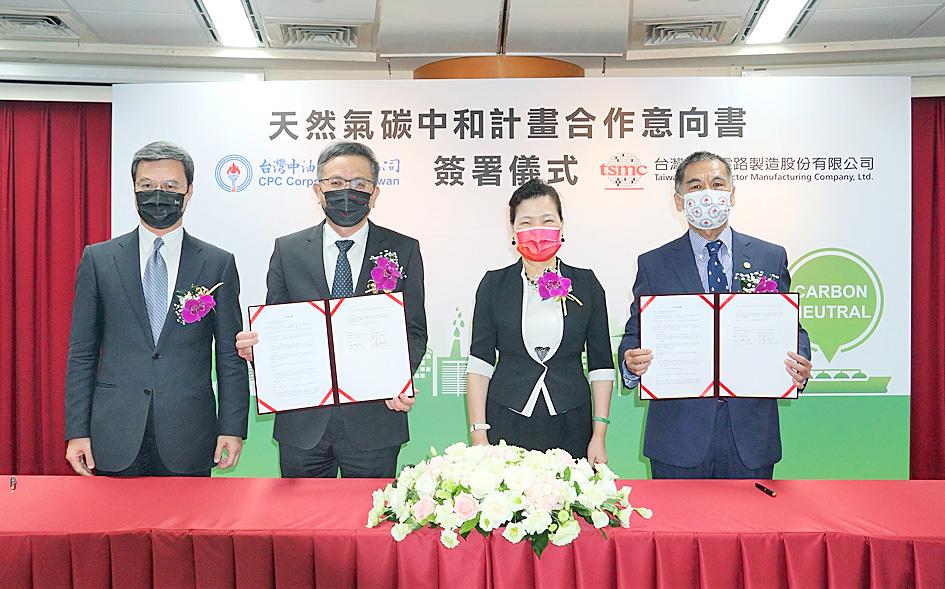CPC Corp, Taiwan (CPC, 台灣中油) on Thursday signed a memorandum of understanding with Taiwan Semiconductor Manufacturing Co (TSMC, 台積電) for a plan to cooperate over the supply of “carbon neutral” liquefied natural gas (LNG).
Speaking at the signing ceremony, Minister of Economic Affairs Wang Mei-hua (王美花) said the agreement between CPC and TSMC to use carbon neutral LNG is a step in the right direction toward Taiwan’s ambitions to achieve net-zero carbon emissions by 2050.
“Let’s take this chance to encourage other companies in Taiwan to realize the green supply chain together,” Wang said.

Photo: Huang Pei-chun, Taipei Times
CPC receives carbon neutral LNG from oil companies such as Royal Dutch Shell PLC, and the company is to use the British Standards Institutions’ PAS 2060 framework to show its results in carbon neutrality and reducing emissions.
“As a major importer of LNG, CPC has a duty to keep importing carbon neutral LNG as a part of our energy transition,” CPC president Lee Shun-chin (李順欽) said. “The provision of carbon neutral natural gas products will help domestic manufacturers meet the decarbonization requirements set by Europe and the US.”
J.K. Lin (林錦坤), senior vice president of information technology, materials and risk management at TSMC, said the chipmaker requested carbon neutral LNG products at the start of the year.
“As the world’s leading semiconductor company, TSMC has been an active promoter of green manufacturing,” Lin said, “In addition to pursuing the use of renewables, we’ve asked for carbon-neutral products from CPC.”

In Italy’s storied gold-making hubs, jewelers are reworking their designs to trim gold content as they race to blunt the effect of record prices and appeal to shoppers watching their budgets. Gold prices hit a record high on Thursday, surging near US$5,600 an ounce, more than double a year ago as geopolitical concerns and jitters over trade pushed investors toward the safe-haven asset. The rally is putting undue pressure on small artisans as they face mounting demands from customers, including international brands, to produce cheaper items, from signature pieces to wedding rings, according to interviews with four independent jewelers in Italy’s main

Japanese Prime Minister Sanae Takaichi has talked up the benefits of a weaker yen in a campaign speech, adopting a tone at odds with her finance ministry, which has refused to rule out any options to counter excessive foreign exchange volatility. Takaichi later softened her stance, saying she did not have a preference for the yen’s direction. “People say the weak yen is bad right now, but for export industries, it’s a major opportunity,” Takaichi said on Saturday at a rally for Liberal Democratic Party candidate Daishiro Yamagiwa in Kanagawa Prefecture ahead of a snap election on Sunday. “Whether it’s selling food or

CONCERNS: Tech companies investing in AI businesses that purchase their products have raised questions among investors that they are artificially propping up demand Nvidia Corp chief executive officer Jensen Huang (黃仁勳) on Saturday said that the company would be participating in OpenAI’s latest funding round, describing it as potentially “the largest investment we’ve ever made.” “We will invest a great deal of money,” Huang told reporters while visiting Taipei. “I believe in OpenAI. The work that they do is incredible. They’re one of the most consequential companies of our time.” Huang did not say exactly how much Nvidia might contribute, but described the investment as “huge.” “Let Sam announce how much he’s going to raise — it’s for him to decide,” Huang said, referring to OpenAI

The global server market is expected to grow 12.8 percent annually this year, with artificial intelligence (AI) servers projected to account for 16.5 percent, driven by continued investment in AI infrastructure by major cloud service providers (CSPs), market researcher TrendForce Corp (集邦科技) said yesterday. Global AI server shipments this year are expected to increase 28 percent year-on-year to more than 2.7 million units, driven by sustained demand from CSPs and government sovereign cloud projects, TrendForce analyst Frank Kung (龔明德) told the Taipei Times. Demand for GPU-based AI servers, including Nvidia Corp’s GB and Vera Rubin rack systems, is expected to remain high,